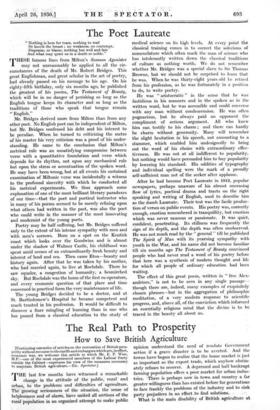The Poet Laureate
" Nothing is here for tears, nothing to wail Or knock the breast ; no weakness, no contempt, Dispraise, or blame, nothing but well and fair And what may quiet us in a death so noble."
THESE famous lines from Milton's Samson Agonistes may not unreasonably be applied to all the cir- cumstances of the death of Mr. Robert Bridges. This great Englishman, and great scholar in the art of poetry, had already passed on his message, to his age. On his eighty-fifth birthday, only six months ago, he published the greatest of his poems, The Testament of Beauty, which will be in no danger of perishing so long as the English tongue keeps its character and so long as the traditions of those who speak that tongue remain " English."
Mr. Bridges derived more from Milton than from any other poet. No English poet can be independent of Milton, but Mr. Bridges confessed. his debt and his interest to be peculiar. When he turned to criticizing the metre of his master his very criticism was a proof of his under- standing. He came to the conclusion that Milton's metrical rule was an unsatisfying compromise between verse with a quantitative foundation and verse which depends for its rhythm, not upon any mechanical rule but upon the stress or accentuation of the spoken word. He may have been wrong, but at all events his sustained examination of Miltonic verse was incidentally a witness to the profound sincerity with which he conducted all his metrical experiments. We thus approach some explanation of one of the most brilliant literary paradoxes of our time—that the poet and poetical instructor who in many of his poems seemed to be merely refining upon what others had written in the past, was also the poet who could write in the manner of the most innovating and modernist of the young poets.
Poetry may be half suffering, but Mr. Bridges suffered only to the extent of his intense sympathy with men and With men's sorrows. Born on a spot on the Kentish coast which looks over the Goodwins and is almost under the shadow of Weimer Castle, his childhood was spent amid scenes of an extraordinarily fresh beauty and interest of land and sea. Then came Eton—beauty and history again. After that he was taken by his mother, who had married again, to live at Rochdale. There he saw squalor, a congestion of humanity, a besmirched sky. But Rochdale was the home of the first co-operators, and every economic question of that place and time concerned in practical form the very maintenance of life.
The young Bridges decided to be a doctor, and at St. Bartholomew's Hospital he became competent and much trusted in his profession. It' would be difficult to discover a finer mingling of learning than in one who has passed from a classical education to the study of medical science on its high levels. At every point the classical training comes in to correct the solecisms of nomenclature which often mark the man of science who has intolerantly written down the classical traditions of culture as nothing worth.,• We do not remember whether Mr. Bridges was a special slave to Sir Thomas Browne, but we should not be surprised to learn that he was. When he was thirty-eight years old he retired from his profession, as he was fortunately in a position to do, to write poetry.
He was " aristocratic " in the sense that he was fastidious in his manners and in the spoken as in the written word, but he was accessible and could converse with any man without condescension. He was often pugnacious, tout he always paid an opponent the compliment of serious argument. All who knew him can_ testify to his charm ; and there can hardly be charm without generosity. Many will remember the slight hesitation in his speech, not amounting to a stammer, which enabled him undesignedly to bring out the word of his choice with extraordinary effec- tiveness. He was not at all indifferent to popularity, but nothing would have persuaded him to buy popularity by lowering his standard. His oddities of typography and individual spelling were the mark of a proudly self-sufficient man not of the seeker after applause.
After he had become Poet Laureate in 1913, popular newspapers, -perhaps unaware of his almost unceasing flow of lyrics, poetical drama and tracts on the right speaking and writing of English, used to describe him as the dumb Laureates Their test was the facile produc- tion of verses on public events. His poetry was, correctly . enough, emotion remembered in tranquillity, but emotion which was never raucous or passionate. It was quiet, confident, penetrating. Its stillness was frequently the sign of its depth, and the depth was often unobserved. He was not much read by the " general " till he published The Spirit of Man with its yearning sympathy with youth in the War, and his name did not become familiar till six months ago The Testament of.Beauty convinced people who had never read a word of his poetry before that here was a synthesis of modern thought and life for which all people of ordinary education had been waiting.
The effect of this great poem, written in " free Alex- andrines," is not to be seen in any single passage— though there are, indeed, many examples of exquisitely chosen phrases—but in the aggregation of philosophic meditation, of a very modern response to scientific progress, and, above all, of the conviction which informed an essentially religious mind that the divine is to be traced in the beauty all about us.




































 Previous page
Previous page